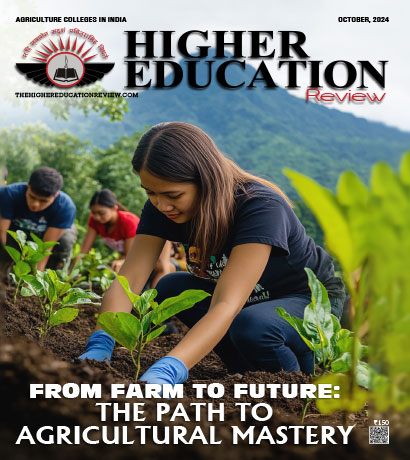Role Of A Great Teacher In Higher Education
 Education is a vital process that changes or transforms and develops an individual. It helps them realize their capabilities, dreams and aspirations. Education is essentially a tool aimed at developing the person than merely providing knowledge inputs. The objectives of education are different among various levels. Creating awareness of self is the primary objective and the introduction to the world at large is the secondary one. In the college it is more of developing the overall personality. This objective cannot be achieved unless the teacher knows the student as closely as possible and he is able to interact with him/her on one to one basis. This is more or less achieved by Great teachers rather than a Good teacher.
Education is a vital process that changes or transforms and develops an individual. It helps them realize their capabilities, dreams and aspirations. Education is essentially a tool aimed at developing the person than merely providing knowledge inputs. The objectives of education are different among various levels. Creating awareness of self is the primary objective and the introduction to the world at large is the secondary one. In the college it is more of developing the overall personality. This objective cannot be achieved unless the teacher knows the student as closely as possible and he is able to interact with him/her on one to one basis. This is more or less achieved by Great teachers rather than a Good teacher.
Who is a Good Teacher?
Good teachers care about their students. They know the content and examine how to explain it. They further expect and demand high levels of performance of students. Good teachers are great performers and storytellers that rivet their student’s attention at the highest possible level.
Who is a Great Teacher?
The best characteristic feature by which we can define an effective teacher is that they don't teach. This might look shocking to read. Then the question comes how can an effective teacher teach without teaching?
Great teachers adopt five smart methods in their teaching mechanism.
1. Constructivism
This is based on the Experiential learning theory proposed by John Dewey in 1935. Great teachers engineer learning experiences that maneuver the students into the driver's seat and then the teachers get out of the way. Students learn best by personally experiencing learning that is physical, emotional, intellectual and spiritual.
2. Project-Based Learning
Gone are the times that we teach content just in case a student might need it. A great teacher will devise a way to give students an urgent reason to learn skills or knowledge and then let them show they have learned it by what they can do.
3. Inquiry
Great teachers will keep the students wanting to come for class just to see what interesting things they will explore and discover each day.
4. Performance Based Learning
Students learn best when they are in control of their learning. This is the simple philosophy that supports a great teacher. Students must do the heavy lifting of learning and nothing the teacher can say or do will change that. Real learning requires doing, not listening, or observing only. Yet we find in every college that teachers talking while students listen, daydream and doze. We call this lecture. Whether it is a lecture, or a power point, it involves talking at the students. While that is commonly viewed as the quickest and easiest way to impart knowledge and skills, it is realized that it is not the most effective. There are times when direct instruction is necessary, but only to be able to do something with that knowledge or skill, but a great teacher devises learning experiences that force all the students to be engaged much like being in the deep end of the swimming pool. Then the lesson on arm and leg strokes becomes relevant. To learn, the students must do something called as Performance-Based Learning.
5. Enhancing Creative Thinking among Students
Critical thinking is defined as a reflective and reasonable thought process embodying depth, accuracy, and astute judgment to determine the merit of a decision, an object, or a theory. Mere thinking might lead a student to engage in the offering personal opinions or life experiences to address a topic, yet the challenge for a teacher is to move students beyond offering personal opinions. Gaining additional thinking skills prompts a student to research the existing body of topical knowledge and respond by repeating the ideas and theories of experts in the subject matter.
As teachers, the goal should be to create a learning environment that causes students to engage in critical reflection and evaluation of the existing literature to render judgment based on a compilation of synthesized evidence. Although a student’s opinion might be relevant and provide a bridge for additional discussion, the challenge is to prompt students to provide justifications and founded explanations of their views.
A student’s critical thinking skills can be strengthened when the teacher probes the student’s viewpoint on the discussion topic by seeking additional clarification, explanation, and justification from the student.
Teachers should prompt students to gain proficiency in research skills to be able to move beyond using personal opinions as the sole basis for responses. Recognizing that critical thinking involves assessment, examination, and reflective reasoning of existing information, ideas, beliefs, and speculations, effective instructors encourage students to gain proficiency in the ability to locate and retrieve scholarly information on the assigned topic. Teachers should respectfully challenge student viewpoint to elicit a deeper, more reflective response.
By stimulating student reasoning process through probing and thought-provoking questions, teachers’ move students beyond being able to define a topic to possessing the ability to make an evaluative value judgment based on in-depth, sound interpretation of relevant information.
Thus is it very pertinent to phrase that great teachers do not teach. They stack the deck so that students have a reason to learn and in the process can't help, they but learn mainly by teaching themselves. This knowledge then becomes permanent and cherished rather than illusory and irrelevant.
Prof. Sumandiran Prithiviraj
Prof. Sumandiran Prithiviraj is currently working with Don Bosco Institute of Biosciences and Management studies, Bangalore, as the Asst. Professor of MBA Dept. and the HOD of B.Com Dept. Earlier, he has worked as the Professor & Head of Management Studies, at NIAM Institute of Applied Management, Bangalore and was also the Asst. Professor of Dept.of MBA at DSI and RVIM, Bangalore. He is also a Lead Consultant and Subject Specialist in Micro Finance, at the Regional Development Bank, Sri Lanka and T&T Solutions and Consultants, Bangalore. He has over 13 years academic experience and 2 years of corporate experience.

